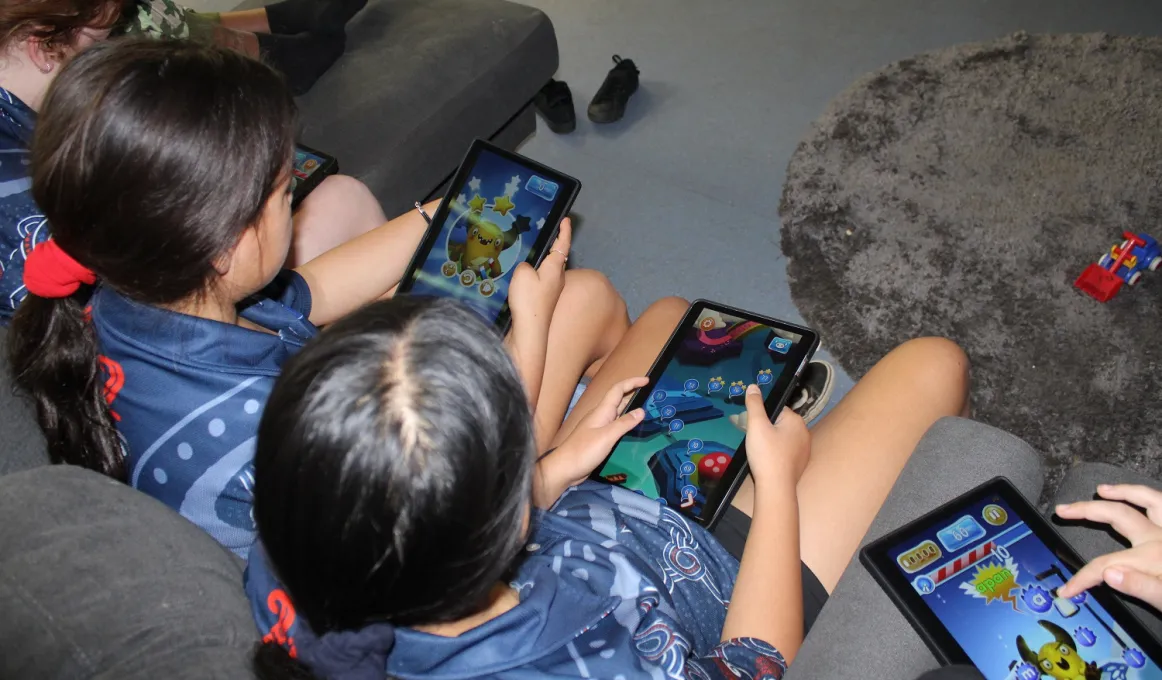Ancient heritage meets modern resources in community-led game Arranji yukurnukku jinta!

Nineteen years of collaboration between the Australian Literacy and Numeracy Foundation and the Papulu Apparr-Kari Aboriginal Corporation have seen the launch of a language space and an early literacy game.
Warumungu is one of the oldest living practiced languages of the Barkly region of the Northern Territory.
Mrs Nixon, a PaPulu Apparr-Kari Aboriginal Corporation (PAK) Language Centre teacher and native speaker of Warumungu, wanted to see the Warumungu language taught and shared.
Along with Mary Ruth, a health worker from the Australian Literacy and Numeracy Foundation (ALNF), Mrs Dixon developed a new way of phonetically teaching language over 20 years ago, which is now used in the newly launched app and resources.
These long-awaited and newly cherished resources are a culmination of nineteen years of collaboration between the ALNF and PAK: the Warumungu Language Space and the Arranji yukurnuuku jinta! (Feed the Monster) early literacy game.
Sadly, Mrs Nixon passed away in 2013. Karan Hayward, Chief Executive Officer of PAK for 29 years, sees the Warumungu Language resources as part of her legacy.
'Mrs Nixon cared about not just her language, but all the languages of the Barkly, she made sure they were all taught and staying strong,' Karan said.
'She was a teacher, she loved sharing her language, taught by her mother and grandmother before her. She spoke six languages - one of them was Indonesian.’
Mrs Nixon’s voice is one of many voices on the platform and app.
The resources are on the award-winning Living First Language Platform. The cloud-based platform can record words, sentences and stories, while also having the functionality to create other resources and apps using the information – like Arranji yukurnuuku jinta!
Karan said the language centre is working on all 16 languages of the region: 'Some of them are sleeping - but we don’t let them sleep, we wake them up.'
PAK has plans to ensure all 16 languages of the Barkly region are made available on the platform. They are currently working on Mudburra and Jingili languages, anticipating they will be launched in the next 12 months.
'That’s the beauty of it, the beauty of being able to share it with the whole of Australia, we share our knowledge so everybody can become strong,’ Karan explained.
'As committed leaders in the preservation of languages nationally and across the Barkly region, this application is a step towards not only keeping our languages strong throughout our region but allowing people both nationally and internationally to learn languages of our First Nations people.’
PAK and ALNF will also be providing the four pilot schools in the Barkly with an Offline Language Station, a way for educators to use the resources without access to the Internet.
ALNF are working with 14 language groups from across Australia. They are committed to the important work of preserving, maintaining and revitalising Aboriginal and Torres Strait Islander languages.
Find out more
The NIAA supports and strengthens First Nations languages by monitoring progress, coordinating and influencing the implementation of Target 16 and the First Nations Languages Policy Partnership (LPP) under the National Agreement on Closing the Gap.
Through the IAS Program 1.4 – Culture and Capability, the NIAA funds a number of initiatives including Indigenous languages interpreting services, the ALNF Digital Living First Languages Platform, and the AIATSIS Indigenous Languages Preservation Dictionaries project.